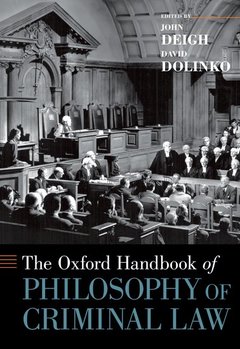Description
The Oxford Handbook of Philosophy of Criminal Law
Oxford Handbooks Series
Language: English
The Oxford Handbook of Philosophy of Criminal Law
Publication date: 10-2019
544 p. · 24.1x16.8 cm · Paperback
Publication date: 10-2019
544 p. · 24.1x16.8 cm · Paperback
The oxford handbook of philosophy of criminal law (hardback) (series: oxford handbooks in philosophy)
Publication date: 09-2011
544 p. · 24.9x17.1 cm · Hardback
Publication date: 09-2011
544 p. · 24.9x17.1 cm · Hardback
Description
/li>Contents
/li>Biography
/li>
This is the first comprehensive handbook in the philosophy of criminal law. It contains seventeen original essays by leading thinkers in the field and covers the field's major topics including limits to criminalization, obscenity and hate speech, blackmail, the law of rape, attempts, accomplice liability, causation, responsibility, justification and excuse, duress, provocation and self-defense, insanity, punishment, the death penalty, mercy, and preventive detention and other alternatives to punishment. It will be an invaluable resource for scholars and students whose research and studies concern philosophical issues in criminal law and criminal law theory.
Preface. 1. The Limits of the Criminal Law. 2. Criminalizing Expression: Hate Speech and Obscenity. 3. Blackmail. 4. An Alleged Act Requirement in the Criminal Law. 5. Attempts. 6. The Philosophical Foundations of Complicity Law. 7. Causation in the Criminal Law. 8. Responsibility. 9. Culpability. 10. Justification and Excuse. 11. Duress. 12. Insanity Defense. 13. Gender Issues in the Criminal Law. 14. Punishment. 15. The Death Penalty and Deontology. 16. Mercy. 17. Alternatives to Punishment. Index.
John Deigh is Professor of Law and Philosophy at the University of Texas at Austin. He is the author of three books, The Sources of Moral Agency, Emotions, Values, and the Law, and An Introduction to Ethics (2010). He was the editor of Ethics from 1997 to 2008. David Dolinko is Professor of Law at the University of California, Los Angeles. His research interests focus on the philosophical underpinnings of criminal law. He has published articles on retributivism, capital punishment, and the privilege against self-incrimination.
© 2024 LAVOISIER S.A.S.




